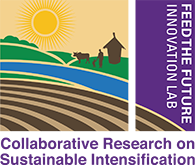From left to right: Adam Keally, Channaty Ngang, Dr. Jan Middendorf, Fatou Tine, Dr. Lyda Hok (Photo credit: Andra Williams)
The World Food Prize (WFP) is a week-long set of events drawing over 1,000 participants globally, where people can attend numerous events dealing with global agriculture and food security. This year’s theme, “Rise to the Challenge”, coincided nicely with the focus of SIIL’s panel discussion, “Youth Engagement in Agriculture”. We were fortunate to have representatives from our projects in Senegal and Cambodia, as well as several SIIL staff members, discuss their thoughts on the importance of engaging youth in agriculture. As SIIL director Dr. Vara Prasad stated in his opening remarks, “Dr. Norman Borlaug was passionate about engaging youth in agriculture”, and the WFP is dedicated not only to honoring the memory of Dr. Borlaug, but also to continuing his legacy.
Addressing the reality of a continually growing global population in conjunction with the lack of desire many young people today are expressing towards a career in agriculture, is a focal point for SIIL. The ability to bring people who are currently engaged in facing these issues head-on to an event like the WFP, means that we were able to introduce them to the broader food and agriculture world. And perhaps more importantly, we were able to introduce their work to others in the field. It is also important that young people understand what a career in agriculture might look like. Adam Keally, a current Peace Corps volunteer in Senegal, stated that “food security was just words in a book to me until I lived in Senegal for two years”, until he was actually able to go out into the field. Making sure that young people are engaged at every level of agriculture is important to the creation of students, researchers and workers, who are passionate.
Our goal as an Innovation Lab is to support researchers as they attempt to tackle agricultural issues in their home countries, helping them to build capacity and promote sustainability for their programs. The WFP allows us to bring together people that inspire each other as well as learn from the events that take place during the week. What young researcher would not be inspired by another young under-40 researcher winning the Borlaug Field Prize, designed to recognize those working in the field of agriculture and food production? The WFP is more than just an annual conference; it is the coming together of many minds and ideas that, in the end, can hopefully help create lasting change around the world.
Cambodians Dr. Lyda Hok and graduate student Channaty Ngang, and Peace Corps volunteer Adam Keally, graduate student Fatou Tine and Dr. Aliou Faye all joined us from Senegal to participate in a panel discussion that would allow them to talk about their experiences in food and agriculture research and extension, and give them the space to share their work with others.
The discussion moderator asked several questions exploring their experiences not only in food and agriculture, but how those experiences impacted their daily work and academic lives. Fatou Tine talked about gender disparity and how hard it was sometimes to cross that barrier, saying that, “As a woman if you are hiring a man, you need to find a way to speak to them to not offend & (so they) do the job”. Dr. Lyda Hok talked about how changing norms means engaging young people in different ways, moving away from traditional capacity development and towards social media and Information and Communication Technology (ICT) as a means of attracting the next generation of agricultural workers. Together, these people represent the future of international sustainable agriculture and we are continually excited to have them be a part of our team.



